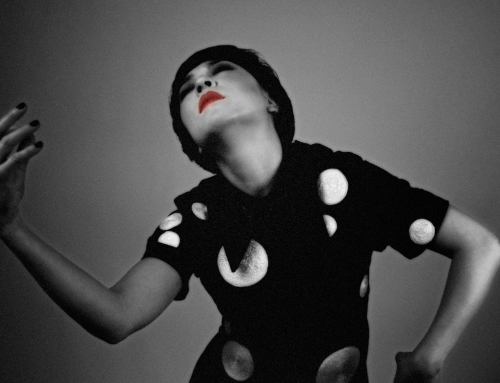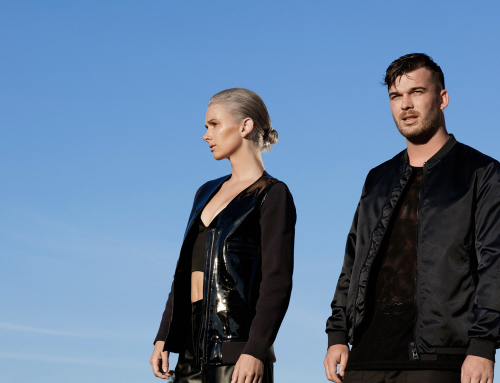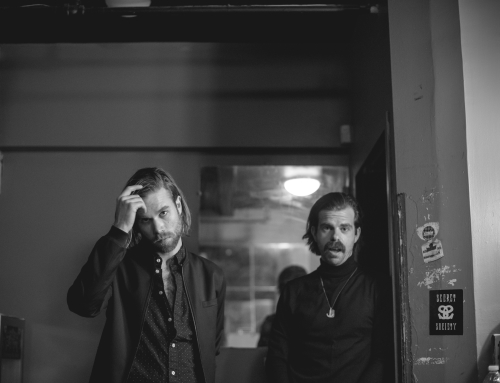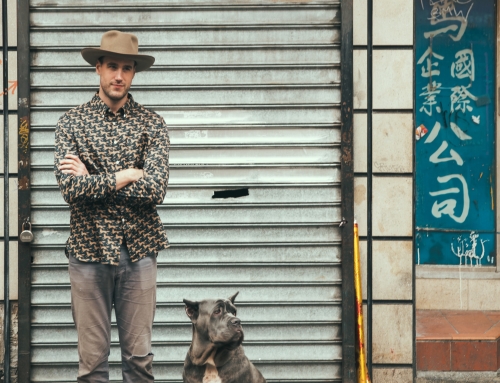Not many people have the guts or strength to put it all out there. In a world where products and people are manufactured to fit our needs and desires it can be hard to feel connected, hard to know whose voice we are hearing, whose perspective is coming through. “Transparency,” the buzzword of the moment is often one that holds little weight. We Are Augustines reveals the true meaning of what feels like the most over-used and under-investigated buzzword of 2011.
Songwriter, guitar player and lyricist, Billy McCarthy has been over, under and through more than most people experience in a lifetime. This isn’t something he’s let someone cover-up or over-exaggerate; for McCarthy it’s not about creating an image. It is this raw, exposed, energy that McCarthy and his fellow songwriter and keyboardist, Eric Sanderson, bring out with each chord and each melody they’ve created.
Like McCarthy and Sanderson, We Are Augustines has an evolution of it’s own; for 8 years McCarthy and Sanderson were part of the up and coming band Pela, who was selling out live shows, playing huge music festivals and getting ready to break onto the music scene in a major way; however that is not what happened.
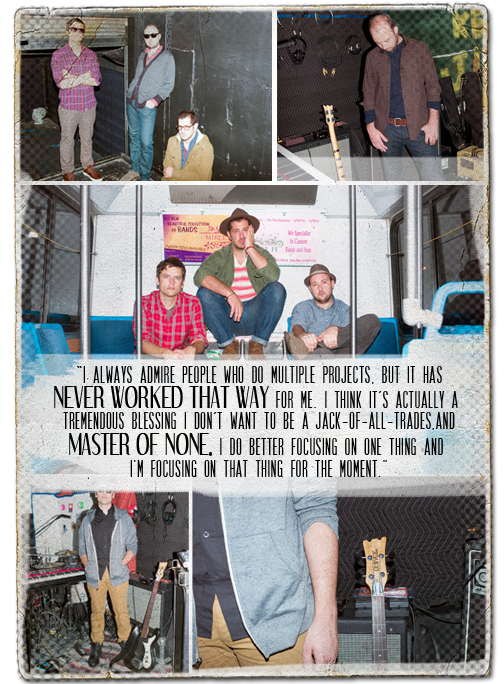
Pela grew apart, bringing McCarthy and Sanderson to a tipping point. With the crossroads clearly laid out before them, they pushed through the realities that life had spun around them to create an album that is moving both musically and lyrically.
With the recent addition of drummer Rob Allen, We Are Augustines pushed past the roadblocks that former band Pela previously failed to knock down, when the band signed with Oxcart Records. Catching up with McCarthy a few days before they embarked on the second phase of their US tour, the musician graciously took my call at 9 a.m. and allowed me to poke and prod his over-worked brain on everything Augustines.
In Conversation
Your sound is self-described as intelligent rock. How does your album continue to pursue this genre?
The methodology is that the music usually starts as a written piece, the lyrical piece; then we kind of address it with music parts afterwards. But for me at least, it’s always sort of a musical piece, so it starts with the words.
There are so many weekend warriors out there, so many musicians who have to take on side project after next. What does it mean for an artist to be able to focus 100% of your time and energy on your craft?
It’s been a great joy for me actually, to be able to focus on one thing. I always admire people who do multiple projects, but it has never worked that way for me. I think it’s actually a tremendous blessing; I don’t want to be a jack-of-all-trades and master of none. I do better focusing on one thing and I’m focusing on that thing for the moment.
And it’s always been music for you?
Ever since I was a teenager music has come first for me. So if I was a bartender or driving a truck or whatever, it was the central focus in my life. So I don’t notice a real difference, I just think now I actually am on the road and there is more of a schedule for us.
Connectivity is something I have been focusing a lot on lately and I really feel like its kind of running rapid at the foundation of everything that exists.
Who or what has been an integral part in defining where you are musically at this point in your career?
I wouldn’t say it’s really anybody external. I think that obviously my partnership with Eric has been a creative life affirming experience, because a part of the central theme of this project is that we really were going to quit. We were facing a very real option of no longer having music being a part of our lives on this level. Part of our story is that the music community couldn’t, and really wouldn’t let us walk away without letting us know how they felt about it. So we are here today largely by the connective-ness of our community. They were like, ‘look you know we understand you guys have been through a lot but we don’t think you should stop. And so I think kind of without our community we might have probably faded away.
Seeing videos of your part performances, the passion behind what you two and now you three have created is incredibly clear. So I have to ask, why is it hard for you to listen to your own music?
Well obviously I think imperfections. I was just thinking about this the other day. I was walking on the beach at night and I really wanted to take a picture of the starts, and of the fire, but realized that no matter what I could never really capture that moment on film properly. I think the same is with rock and roll shows. It’s pretty hard to get a visceral representation of what’s going on, via iPhone.
I love that comparison.
And I just woke up three minutes ago, hey!
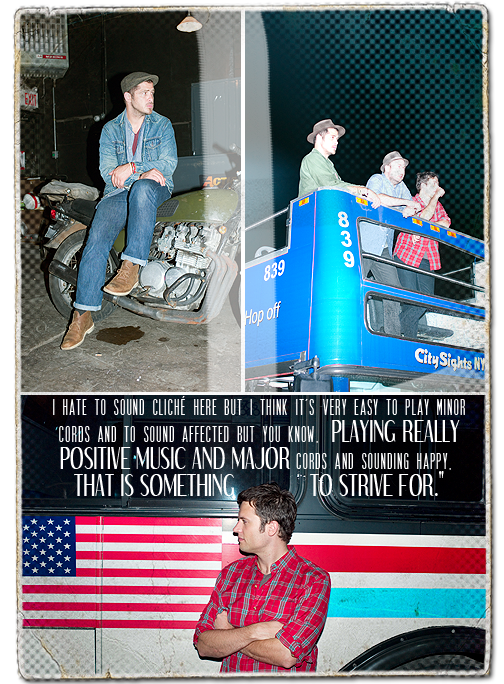
How would you like your latest work to be received?
I think we’ve made it to a point that we just felt like if we didn’t explain the context of the record it would probably get misunderstood. So for me it’s important for people to understand what it’s about and the way it is about to us. And why it took so long… I think being a little more informed and you’ll get a better listening experience out of it and have a better listening experience in general.
What song is trapped inside you, fighting to be written?
I don’t know because it’s not written yet!
As a writer, there are things I know I need to write about eventually and either I have not been able to find the words or allow myself to connect with the emotion in a way that I can express it yet…
I hate to sound cliché here but I think it’s very easy to play minor cords and to sound affected but you know, playing really positive music and major cords and sounding happy, that is something to strive for. They say that blues music is, what is it, a good day of feeling bad or a bad day of feeling good. I’d kind of like to be a good day of feeling good.
So you guys started your tour but it ended early because of the hurricane in New York?
We had a funny experience. We were on NPR at WNYC in New York and as we were going on, 20 minutes before we went on the air to perform, there was an earthquake. So we got evacuated into the street with some of our heroes, the DJ’s at the station like Leonard Lopate, Brian Lehrer and John Schaefer; we were out being evacuated with them. So it was weird to see our heroes in that context. Then not even a week later, we’re departing on tour in the middle of a hurricane. While we were in a barn in Vermont performing, there was a hurricane happening back home; it was kind of crazy.
What was the most unexpected reaction you had during this first tour, what’s been the general vibe?
I met a guy who drove 17 hours through the hurricane to see us, all the way from Ohio. He drove 17 hours to see one show. It was pretty incredible. So there is something very humbling in these experiences meeting people. We don’t take that lightly, it was very moving.
My last question for you, do you believe in happily ever after?
Yeah, I do. I think that on a soul level sure. Life is about character and I think character is something you work on everyday, your whole life. If you can work on yourself and have good character, I think happiness is coming your way and yeah you might have your off days but generally I think if you are a force of good in the world and that is what you are shooting for, you can live happily ever after.
Special thanks to Moscot and Alejandro Ingelmo for providing sunglasses and shoes.







